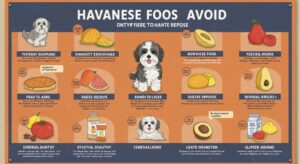If you’re a proud Havanese parent, you already know how lovable and playful this breed can be. With their cheerful personalities and loyal nature, Havanese dogs quickly become beloved members of the family. But when it comes to their diet, many owners unknowingly feed them harmful foods. In this guide, we’ll highlight the most dangerous foods for Havanese dogs and explain why they should be avoided.
Why Diet Matters for Your Havanese

The Havanese is a small, sturdy breed that thrives on balanced nutrition. Because of their compact size and sensitive digestive systems, even small amounts of toxic food can lead to serious health issues. Feeding your Havanese the right diet is essential to keep them active, healthy, and happy.
Top Havanese Foods to Avoid
Let’s take a look at the foods that are especially harmful for your Havanese.
1. Chocolate
Chocolate is one of the most common food toxins for dogs. It contains theobromine and caffeine, both of which are toxic to dogs. Even a small amount can lead to symptoms such as vomiting, diarrhea, increased heart rate, and in severe cases, seizures or death.
Tip: Keep chocolate products, especially dark chocolate and baking chocolate, out of reach of your Havanese at all times.
2. Grapes and Raisins
Although it’s not fully understood why, grapes and raisins can cause acute kidney failure in dogs, including Havanese. Some dogs may be more sensitive than others, but it’s not worth the risk.
Signs of toxicity: Vomiting, lethargy, and a decrease in appetite or urination.
3. Onions and Garlic
Whether raw, cooked, or powdered, onions and garlic can damage your dog’s red blood cells, leading to anemia. The effects are more dangerous in smaller breeds like the Havanese.
Note: Onion and garlic powder are commonly found in processed foods, so always check ingredient labels.
4. Xylitol (Artificial Sweetener)
Xylitol is a common sugar substitute found in sugar-free gum, candy, and some baked goods. When ingested by dogs, xylitol can cause a rapid insulin release, leading to hypoglycemia (low blood sugar), seizures, and liver failure.
Action: Never give your Havanese sugar-free snacks meant for humans.
5. Avocado
Avocados contain persin, a fungicidal toxin that can cause gastrointestinal issues in dogs. While some dogs tolerate small amounts, it’s best to avoid avocados altogether, especially the skin and pit.
Warning: The avocado pit can also pose a choking hazard or cause an intestinal blockage.
6. Macadamia Nuts
Even a few macadamia nuts can cause weakness, tremors, vomiting, and overheating in dogs. The exact cause of toxicity is unknown, but the effect on small breeds like Havanese can be significant.
Quick Tip: Avoid feeding any kind of nuts to your dog, especially salted or flavored varieties.
7. Cooked Bones
Many owners believe bones are a natural treat for dogs. However, cooked bones can splinter easily and cause choking, internal injuries, or intestinal blockages.
Better alternative: Offer your Havanese raw bones or specially made dental chews instead.
8. Alcohol
Even a small amount of alcohol can be extremely dangerous to a Havanese. Dogs are much more sensitive to ethanol than humans, and alcohol can cause vomiting, lack of coordination, difficulty breathing, and even coma.
Keep in mind: Fermented foods and unbaked yeast dough can also produce alcohol internally and should be avoided.
9. Caffeine
Caffeine, found in coffee, tea, energy drinks, and certain medications, is toxic to dogs. Havanese dogs are particularly at risk due to their small size.
Symptoms of caffeine toxicity: Restlessness, heart palpitations, tremors, and seizures.
10. Dairy Products
Many dogs, including Havanese, are lactose intolerant. Feeding them milk, cheese, or ice cream can lead to digestive problems like gas, bloating, and diarrhea.
Alternative treats: Try lactose-free dog-safe cheese or specially made dog ice creams.
Signs of Food Poisoning in Havanese Dogs
If your Havanese accidentally eats something toxic, symptoms can appear within hours. Watch out for:
- Vomiting or diarrhea
- Lethargy or weakness
- Excessive drooling
- Tremors or seizures
- Loss of coordination
- Loss of appetite
If you notice any of these signs, contact your veterinarian immediately.
Safe Treat Alternatives for Havanese
Instead of human snacks, try offering your Havanese:
- Baby carrots
- Blueberries
- Green beans
- Cooked chicken (unseasoned)
- Dog-safe peanut butter (xylitol-free)
- Commercially made dog treats
These options are not only safe but also nutritious and satisfying.
Tips for Preventing Accidental Ingestion
- Store human food out of reach – including countertops and tables.
- Educate family members and guests about what not to feed your dog.
- Use dog-proof trash cans to prevent scavenging.
- Keep an emergency vet contact on hand just in case.
Final Thoughts
Your Havanese depends on you for love, care, and most importantly—safe nutrition. By avoiding these harmful foods, you’re taking an essential step in keeping your furry friend healthy for years to come. Remember, when in doubt, always consult your vet before introducing new foods into your Havanese’s diet.
Frequently Asked Questions (FAQs)
Q: Can my Havanese eat bananas?
A: Yes, bananas are safe in moderation. They’re a great source of potassium and fiber.
Q: What fruits are good for Havanese?
A: Blueberries, apples (without seeds), watermelon (seedless), and strawberries are safe and healthy treats.
Q: Are eggs safe for Havanese dogs?
A: Yes, cooked eggs are a great source of protein and are perfectly safe for most dogs.